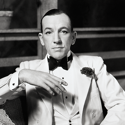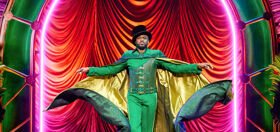
We’re back again. You’ve seen the awful spinoffs. You’ve read about the awful sitcoms. And, yes, it gets worse. Television shows have a notoriously high rate of failure. When it comes to LGBTQ-themed TV, that rate drops even sharper. For every Queer as Folk, audiences get about five duds. Have a look at some more of the absolute worst attempts at queer(ish) themed television in history…
It’s All Relative
ABC tried to make fun of the widening cultural divide of 2003 with this unfortunate sitcom about a young couple, one from a conservative Irish-Catholic family, the other from an upper-class background with same-sex parents, who have to cope with the ongoing cultural clashes between their relatives.
It’s All Relative aimed for the later success of Modern Family, albeit with harder, more All In the Family type edge. The always reliable John Benjamin Hickey and Christopher Sieber (both of whom are gay in real life) played same-sex couple Philip and Simon, though they were burdened by stereotypical characters.
Ratings for the show started out strong, given a lead-in from My Wife & Kids. Still, the grating characters and jokes infused with homophobia, plus tough competition from American Idol, viewership quickly disintegrated. ABC pulled the plug after 20 episodes aired, leaving the remaining two that were completed on the shelf.
How about we take this to the next level?
Our newsletter is like a refreshing cocktail (or mocktail) of LGBTQ+ entertainment and pop culture, served up with a side of eye-candy.
Boy Meets Boy
The early 2000s saw the rise of reality television, as networks realized the low-cost/high-profit business model proved far more lucrative than scripted shows of more artistic merit. Getting people to act like total jackasses on camera also proved easier than anticipated.
Of course, that led to some atrocious (even by reality TV standards) attempts at entertainment, including the abomination known as Boy Meets Boy, which tried to emulate the popularity of such shows as The Bachelor by introducing a single gay man in search of love. Of course, in 2004, God forbid a reality show actually show respect to queer people, or, that matter, air without some heinous twist.
In this case, producers came up with the not-so-bright idea to include a mix of gay and straight men as potential suitors. If the gay bachelor, a single guy named James, picked a gay man, the two would get a luxurious romantic vacation. But if he picked a straight man, the straight dude got to pocket $25,000 and James got nothing. Worse, he didn’t even know about the twist until almost the final episode.
Boy Meets Boy ran a full season of seven episodes, and though James did pick a gay man, the pair never got their romantic trip together. The show also never got a second season, thanks to viewer antipathy and outcry from critics who didn’t appreciate the producers for treating gay love like a freak show.
The Jerry Springer Show
Ok, so Jerry Springer wasn’t exactly intended as an LGBTQ show. That said, Mr. Springer and company frequently featured LGBTQ people and storylines as part of the show’s notorious trash circus. Episode topics included such gems as “I’m Gay for Pay,” “My Sister Stole My Gay Boyfriend,” “Your Dude’s Gay,” “I’m Not Gay No More,” “Stranger Things on Springer,” and “He-She Confessions.” The latter, in particular, mocked the plight of transgender people with cruel indignity.
Even crueler: the show was a ratings smash, and by the late 1990s, had bested The Oprah Winfrey Show as the most-watched talk show on TV. By 2002, TV Guide had named it the single worst show in television history, and even Jerry Springer himself said he would never watch or recommend the show to anyone. For the record, neither would we.
Father of the Pride
NBC thought they could tap fans of Shrek-type irreverent comedy with this animated sitcom about lions. The network spent a reported two years recording, animating, and promoting the show before it ever aired. The premise revolved around a group of white lions working in the Las Vegas show of Siegfried and Roy (voiced by Julian Holloway and David Herman, respectively).
While the series played coy about the magicians’ sexuality, it got far more overt when it came to lesbian gophers Chimmi & Changa (Tress MacNeille), who delighted in making out on camera, and to the young lion Hunter (Daryl Sabara) who occasionally showed gay tendencies. Stories revolved around lead lions Larry and Kate (John Goodman and Cheryl Hines) trying to stay afloat in showbiz, make sure their cubs got into good schools, or seeking out Kelsey Grammer (whom they mistakenly believed was his character from Frasier) for therapy.
Despite a reported $2 million per episode price tag, the involvement of DreamWorks mastermind Jeffrey Katzenberg, and even a Shrek crossover episode featuring Eddie Murphy in his role as Donkey, Father of the Pride faced an uphill battle. A marketing blitz helped it debut to strong ratings, but overexposure caused a massive drop in viewership. Competition with the 2004 Presidential race didn’t help, as the show kept getting preempted. NBC finally nixed it in December 2004 before burning off a few episodes the following spring, effectively turning this Pride to embarrassment.
Bette
OK, so it’s not exactly queer, but a show that stars an LGBTQ icon—as well as one that features guest spots from Lindsay Lohan, Olivia Newton-John, Tim Curry, and Dolly Parton—certainly played to a queer audience.
Bette debuted as the most hyped series of CBS’ Fall 2000 lineup. The show aimed to give Bette Midler the Seinfeld treatment. The singer-actress played a fictionalized version of herself trying to manage her career as well as her family life. The pilot episode snagged great reviews from critics and great ratings, too. It looked like great success lay ahead… until backstage woes started to bleed into the public.
First, the show recast Lohan with Marina Malota as Bette’s daughter when shooting moved from New York to Los Angeles. but the network didn’t bother to reshoot Malota’s scenes in the pilot, leading to immediate viewer confusion and disappointment. Midler found the process of shooting a weekly series grueling and began to clash with CBS executives. Kevin Dunn, who played Bette’s husband, found himself ever more frustrated by playing second fiddle to Midler that he successfully lobbied to get out of his contract and was replaced with Robert Hayes.
Ratings had already begun to drop before Midler then committed the ultimate Hollywood faux-pas. In an interview with David Letterman, she spoke out about her frustrations with the show, CBS, the filming schedule, and the series recastings. Bosses at the network exploded, jostling the schedule around to—Midler later alleged—purposely hurt the series. CBS then pulled the plug, and a furious Midler negotiated a $1 million deal for a tell-all book with Simon & Schuster. Titled Canceled, the tome never came to be because Viacom, parent company of both CBS and Simon & Schuster, stepped into quash the project.
In other words, the show actually got Midler canceled twice.


















Jaquelope
Kevin Dunn must have had a very high opinion of himself if he thought he was “frustrated” by being second fiddle to an established star. Even though the series didn’t go anywhere, Robert Hayes, who replaced Dunn, became a big star in his own right, and Dunn basically slipped into obscurity.
It serves him right.
storm45701
Robert Hayes had great success before this mess of a series, especially with “Starman” and the “Airplane!” movies.
jaimedance3
It’s All Relative and Bette were pretty damn good shows. They could have actually had a couple of good season’s if the audience would have only given them a chance like I did! And Father Of The Pride was a cute show. Because come on who did not like Siegfried and Roy! It surely is a damn shame that the audience couldn’t have given these shows an actual chance! Speaking of 1 season shows if you’re looking for a particular 1 season show try crakle TV because I have been enjoying some of the good shows that were only given 1 season for example David Cassidy Man Undercover and Houston Knights! And I learned from an actor friend of mine who actually was 1 of the main stars of the show that Houston Knights could have lasted at good 5, 6 even 7 years but the new person who is in charge of CBS at that time did not care for the show.
tzwicky
So the question for me is …… where can I see “Bette”? I searched in all the regular places and came up empty. Can CBS still be so POed that it’s never been released to any streaming platform?
MacAdvisor
Did anyone notice the bag Bette brought the music home in? I swear it was a Tower Records bag. Miss them.